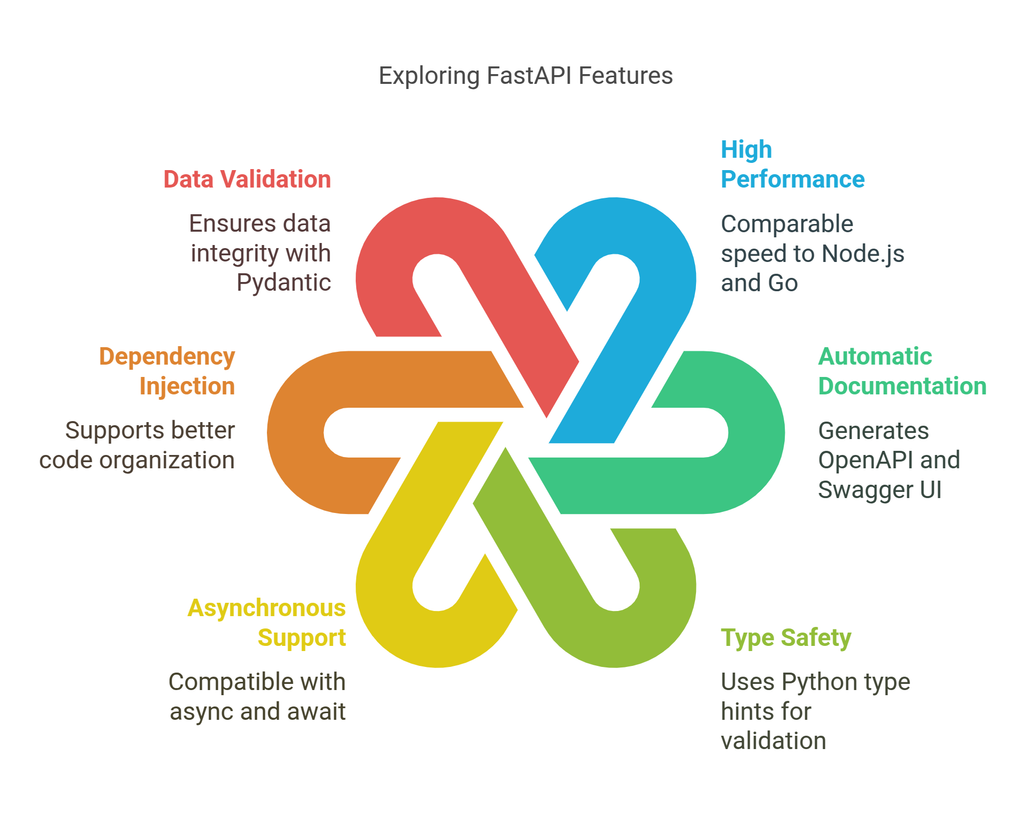FastAPI Tutorial: Build APIs with Python Instantly

APIs (Application Programming Interfaces) are essential for building modern applications. FastAPI is a powerful, high-performance web framework for Python that allows you to build APIs quickly and efficiently. In this tutorial, we’ll explore FastAPI, its features, and how to build a simple API from scratch.
What is FastAPI?
FastAPI is a modern, fast (high-performance), and easy-to-use web framework for building APIs with Python 3.6+ based on standard Python type hints. It’s designed to be easy to use while offering features that make API development faster and more robust.
Key Features of FastAPI:
High Performance: As fast as Node.js and Go, thanks to Starlette and Pydantic.
Automatic Documentation: Generates OpenAPI and Swagger UI documentation automatically.
Type Safety: Uses Python type hints for automatic data validation.
Asynchronous Support: Fully compatible with async and await for non-blocking requests.
Dependency Injection: Supports dependency injection for better code organization.
Data Validation: Pydantic ensures data integrity and validation.

Installation
Before starting, ensure you have Python 3.6+ installed. Then, install FastAPI and Uvicorn (an ASGI server) using pip:
pip install fastapi uvicornCreating a Basic FastAPI App
Let’s create a simple FastAPI application.
1. Create a Python file
(e.g., main.py) and add the following code:
from fastapi import FastAPI
app = FastAPI()
@app.get("/")
def read_root():
return {"message": "Hello, FastAPI!"}2. Running the Server
Run the application using Uvicorn:
uvicorn main:app --reloadYour API will be available at http://localhost:8000/. You can access the automatic documentation at:
- Swagger UI:
http://localhost:8000/docs - ReDoc:
http://localhost:8000/redoc
Creating API Endpoints

1. Path Parameters
You can define dynamic paths using parameters:
@app.get("/items/{item_id}")
def read_item(item_id: int):
return {"item_id": item_id}Accessing http://localhost:8000/items/5 will return:
{"item_id": 5}2. Query Parameters
Query parameters allow passing optional data with API requests:
@app.get("/users")
def get_users(skip: int = 0, limit: int = 10):
return {"skip": skip, "limit": limit}Example: http://localhost:8000/users?skip=5&limit=15
3. Request Body (POST Method)
Use pydantic.BaseModel for request body validation:
from pydantic import BaseModel
class Item(BaseModel):
name: str
price: float
is_offer: bool = None
@app.post("/items/")
def create_item(item: Item):
return {"item": item}Test it by sending a POST request with JSON data:
{
"name": "Laptop",
"price": 1000.0,
"is_offer": true
}Handling Different HTTP Methods
FastAPI supports all HTTP methods like GET, POST, PUT, DELETE, PATCH:
@app.put("/items/{item_id}")
def update_item(item_id: int, item: Item):
return {"item_id": item_id, "item": item}
@app.delete("/items/{item_id}")
def delete_item(item_id: int):
return {"message": f"Item {item_id} deleted"}Using Dependency Injection
FastAPI provides dependency injection to help modularize your application.
from fastapi import Depends
def common_parameters(q: str = None, limit: int = 10):
return {"q": q, "limit": limit}
@app.get("/search/")
def search(params: dict = Depends(common_parameters)):
return paramsHandling Authentication
FastAPI supports OAuth2 authentication with JWT (JSON Web Tokens):
from fastapi.security import OAuth2PasswordBearer
oauth2_scheme = OAuth2PasswordBearer(tokenUrl="token")
@app.get("/users/me")
def read_users_me(token: str = Depends(oauth2_scheme)):
return {"token": token}Middleware and Background Tasks
You can use middleware for global request handling:
from fastapi.middleware.cors import CORSMiddleware
app.add_middleware(
CORSMiddleware,
allow_origins=["*"],
allow_credentials=True,
allow_methods=["*"],
allow_headers=["*"],
)You can also run background tasks:
from fastapi import BackgroundTasks
def write_log(message: str):
with open("log.txt", "a") as f:
f.write(message + "\n")
@app.post("/log")
def log_message(message: str, background_tasks: BackgroundTasks):
background_tasks.add_task(write_log, message)
return {"message": "Log task added"}Conclusion
FastAPI is an excellent choice for building high-performance APIs with Python. It provides built-in validation, automatic documentation, and modern development features that make API building fast and efficient. With its async support and dependency injection, FastAPI is suitable for a wide range of applications, from small projects to enterprise solutions.
Try out FastAPI today and experience the ease of building APIs instantly!
